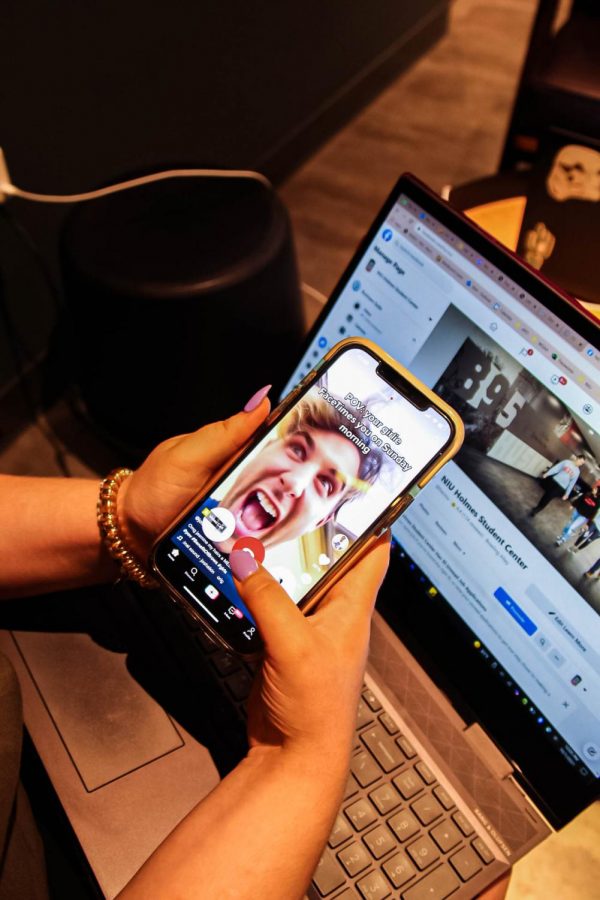Harmless fun on TikTok may be addiction
An NIU student takes a break from homework to watch some TikTok videos.
October 19, 2021
The video sharing platform TikTok is like no other social media app; the elements of TikTok such as collaborating, dueting, added effects and more have impressed over a billion users and viewers. Gen Z makes up 60% of users, according to TikTok’s data. Since the popular app dominates other platforms and keeps some people’s heads glued to their phones, we need to address how TikTok has become our new obsession.
ByteDance founder Zhang Yiming created TikTok in 2016 under its former name, Musical.ly. Through Musical.ly, Yiming demonstrated how viewers can find similar videos using an algorithm fueled by the user’s previous likes.
The immersive social media platforms generate a feed for the audience according to what content they view. Platforms like TikTok have artificial intelligence that is guided by previously liked content, and due to this, a person’s feed would be overloaded with personal content that’s made for them. Thus, the extensive amount of hours scrolling seems inevitable and can lead to some having behavioral signs of excessive internet use.
TikTok has been the go-to platform due to its reigning features of comedy, dance, interaction and more. During the pandemic, many people used TikTok to entertain themselves. What makes TikTok addicting to users is the high traffic of different content streamed, its feature of having people connected with each other and their ability to make short clips that will easily catch an audience’s attention, according to DataSeries.
Not only is TikTok’s algorithm great for boosting people’s content, but one’s feed is designed in a way that generates the content one might be interested in. Content that is deemed to be addictive has to be short and captivating, according to DataSeries.
“TikTok may be addictive if the content provides enough stimulus for the users to exhibit addiction symptoms and a neurological reaction that is consistent with addiction,” according to DataSeries.
One must have behaviors that distract them from their daily activities, the inability to stop using, or negative health effects, are common symptoms of an addiction, according to a research study by Peng Sha and Xiaoyu Dong. These factors can become an issue for many people with signs of addiction. Since this is a highly streamed app full of various entertainment, it can be the root of why people, specifically the younger generation, are obsessed with the app.
We must understand how TikTok works. This app is used by many young people and it serves as an app for entertainment and Immersion, according to Frontiers in Public Health.
The content shown on TikTok varies for different people due to their set algorithm on their “For You Page.” The reason behind the obsession with TikTok is because of its popularity in the world and how many advantages people have gotten from being a part of it. Many people on the app post TikToks to gain popularity, like influencer Charli D’Amelio, who started out making TikToks before the app gained huge recognition and became internet famous on the app.
Teanna Slack, a sophomore public health major, believes many people post TikToks for popularity gain.
“Most of them post to gain clout because they think it’s so easy when in reality the algorithm favors those out of luck,” Slack said.
Monique Wade, a sophomore English major, believes that this app attracts many Gen Z users due to boredom, especially during the pandemic.
“There’s a lot of attractive and famous people on the platform, and most people are on TikTok for entertainment,” Wade said.
Like most mobile apps, when TikTok was first introduced, people became interested and wanted to see what it was about. Perhaps once the popularity wears down, people will look for other places to find entertainment.
David Gunkel, media studies professor, believes that the longevity of TikTok’s platform will last as long until the next app takes viewers’ attention.
“TikTok provided the video sharing content that performed in a way no other platforms have used,” Gunkel said.
With easy access to a wide variety of content on TikTok, people of this generation are spending more time on their phones. What may seem like harmless fun may actually be an addiction.







